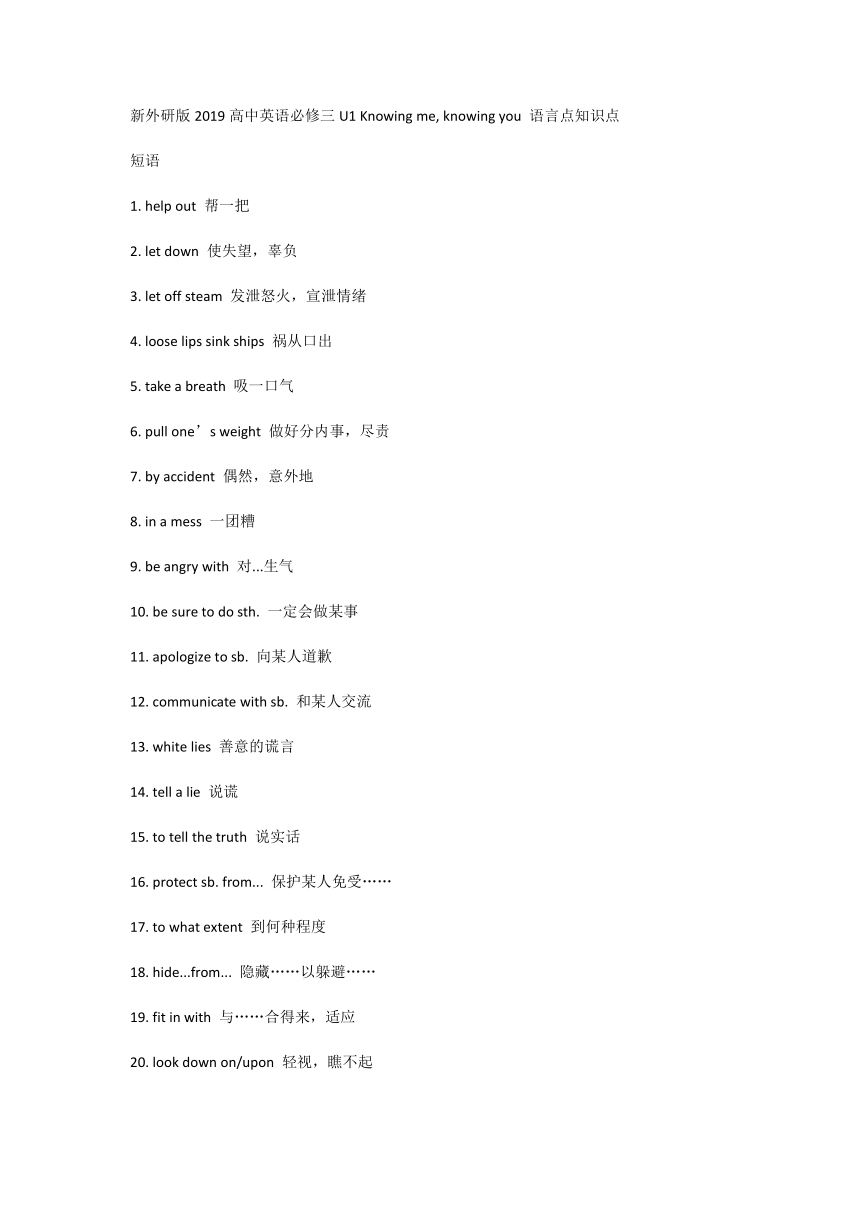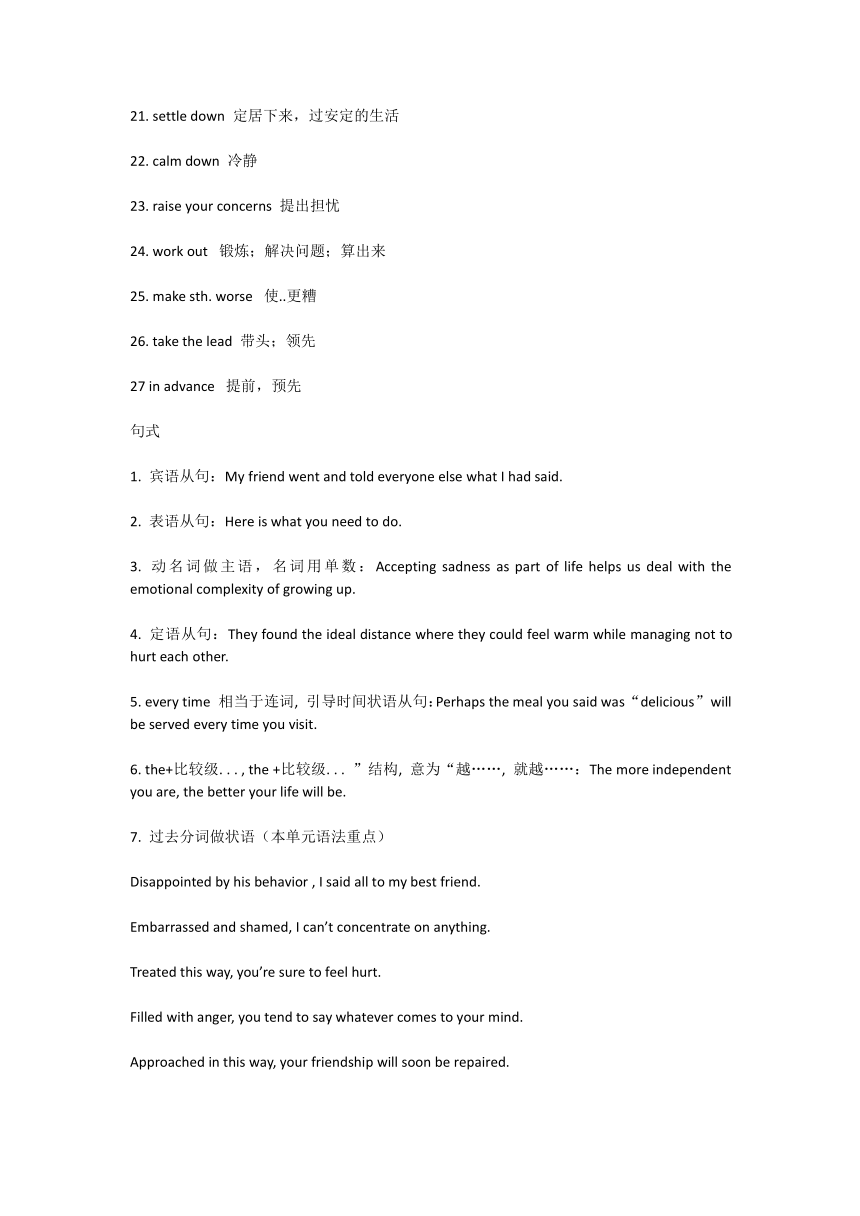Unit 1 Knowing Me, Knowing You 知识清单(讲义)-2024-2025学年高一英语外研版(2019)必修第三册
文档属性
| 名称 | Unit 1 Knowing Me, Knowing You 知识清单(讲义)-2024-2025学年高一英语外研版(2019)必修第三册 |

|
|
| 格式 | docx | ||
| 文件大小 | 19.4KB | ||
| 资源类型 | 教案 | ||
| 版本资源 | 外研版(2019) | ||
| 科目 | 英语 | ||
| 更新时间 | 2025-01-29 00:00:00 | ||
图片预览


文档简介
新外研版2019高中英语必修三U1 Knowing me, knowing you 语言点知识点
短语
1. help out 帮一把
2. let down 使失望,辜负
3. let off steam 发泄怒火,宣泄情绪
4. loose lips sink ships 祸从口出
5. take a breath 吸一口气
6. pull one’s weight 做好分内事,尽责
7. by accident 偶然,意外地
8. in a mess 一团糟
9. be angry with 对...生气
10. be sure to do sth. 一定会做某事
11. apologize to sb. 向某人道歉
12. communicate with sb. 和某人交流
13. white lies 善意的谎言
14. tell a lie 说谎
15. to tell the truth 说实话
16. protect sb. from... 保护某人免受……
17. to what extent 到何种程度
18. hide...from... 隐藏……以躲避……
19. fit in with 与……合得来,适应
20. look down on/upon 轻视,瞧不起
21. settle down 定居下来,过安定的生活
22. calm down 冷静
23. raise your concerns 提出担忧
24. work out 锻炼;解决问题;算出来
25. make sth. worse 使..更糟
26. take the lead 带头;领先
27 in advance 提前,预先
句式
1. 宾语从句:My friend went and told everyone else what I had said.
2. 表语从句:Here is what you need to do.
3. 动名词做主语,名词用单数:Accepting sadness as part of life helps us deal with the emotional complexity of growing up.
4. 定语从句:They found the ideal distance where they could feel warm while managing not to hurt each other.
5. every time 相当于连词, 引导时间状语从句:Perhaps the meal you said was “delicious” will be served every time you visit.
6. the+比较级. . . , the +比较级. . . ”结构, 意为“越……, 就越……:The more independent you are, the better your life will be.
7. 过去分词做状语(本单元语法重点)
Disappointed by his behavior , I said all to my best friend.
Embarrassed and shamed, I can’t concentrate on anything.
Treated this way, you’re sure to feel hurt.
Filled with anger, you tend to say whatever comes to your mind.
Approached in this way, your friendship will soon be repaired.
Written more than two hundred years ago, these lines remain one of the most well-known excerpts.
语法:过去分词作状语
过去分词作状语时,可表示原因、条件、让步、时间、方式和伴随情况。过去分词作方式状语和伴随状语时可以变为并列分句,作其他状语时可以变为相应的状语从句。
1.结构:done
2.逻辑主语:主句的主语
3.关系构成:与主句的主语构成动宾关系 / 主句的主语与过去分词构成被动关系
4.意义:
1)作时间状语:相当于时间状语从句。可在过去分词前加上连词“when, while, until”等,使其时间意义更明确。
Asked for his views about his teaching job, Philip said he found it very interesting and rewarding.
=When asked for his views about his teaching job, Philip said he found it very interesting and rewarding.
=When Philip was asked for his views about his teaching job, Philip said he found it very interesting and rewarding.
当被问到对教学工作的观点时,菲利普说他觉得它既有趣又有意义。
2)作原因状语:相当于原因状语从句或并列句。
Absorbed in painting, John didn't notice evening approaching.
=Because John was absorbed in painting, he didn't notice evening approaching.
=John was absorbed in painting, so he didn't notice evening approaching.
由于专心画画,约翰没有注意到夜幕正在降临。
3)作条件状语:相当于条件状语从句。可加连词if, unless等转换成条件状语从句。
Used with care, one tin will last for six weeks.
= If used with care, one tin will last for six weeks.
= If one tin is used with care, one tin will last for six weeks.
如果用得仔细的话,一罐可以用六周。
4)作让步状语:相当于让步状语从句。有时可加although, though, even if, even though, whether...or 等连词转换成让步状语从句。
Defeated by his opponent, he never gave up any hope.
=Although defeated by his opponent, he never gave up any hope.
=Although he was defeated by his opponent, he never gave up any hope.
尽管被对手击败,但是他从没放弃希望。
5)作方式、伴随状语:相当于and连接的并列句。
She accepted the gift, deeply moved.
=She accepted the gift, and she was deeply moved.
她接受了礼物,深深地被感动了。
5.过去分词(done)与现在分词(doing)作状语的区别:
过去分词与句子的主语之间存在逻辑上的动宾关系,即表示被动;
现在分词与句子的主语之间存在逻辑上的主谓关系,即表示主动。
短语
1. help out 帮一把
2. let down 使失望,辜负
3. let off steam 发泄怒火,宣泄情绪
4. loose lips sink ships 祸从口出
5. take a breath 吸一口气
6. pull one’s weight 做好分内事,尽责
7. by accident 偶然,意外地
8. in a mess 一团糟
9. be angry with 对...生气
10. be sure to do sth. 一定会做某事
11. apologize to sb. 向某人道歉
12. communicate with sb. 和某人交流
13. white lies 善意的谎言
14. tell a lie 说谎
15. to tell the truth 说实话
16. protect sb. from... 保护某人免受……
17. to what extent 到何种程度
18. hide...from... 隐藏……以躲避……
19. fit in with 与……合得来,适应
20. look down on/upon 轻视,瞧不起
21. settle down 定居下来,过安定的生活
22. calm down 冷静
23. raise your concerns 提出担忧
24. work out 锻炼;解决问题;算出来
25. make sth. worse 使..更糟
26. take the lead 带头;领先
27 in advance 提前,预先
句式
1. 宾语从句:My friend went and told everyone else what I had said.
2. 表语从句:Here is what you need to do.
3. 动名词做主语,名词用单数:Accepting sadness as part of life helps us deal with the emotional complexity of growing up.
4. 定语从句:They found the ideal distance where they could feel warm while managing not to hurt each other.
5. every time 相当于连词, 引导时间状语从句:Perhaps the meal you said was “delicious” will be served every time you visit.
6. the+比较级. . . , the +比较级. . . ”结构, 意为“越……, 就越……:The more independent you are, the better your life will be.
7. 过去分词做状语(本单元语法重点)
Disappointed by his behavior , I said all to my best friend.
Embarrassed and shamed, I can’t concentrate on anything.
Treated this way, you’re sure to feel hurt.
Filled with anger, you tend to say whatever comes to your mind.
Approached in this way, your friendship will soon be repaired.
Written more than two hundred years ago, these lines remain one of the most well-known excerpts.
语法:过去分词作状语
过去分词作状语时,可表示原因、条件、让步、时间、方式和伴随情况。过去分词作方式状语和伴随状语时可以变为并列分句,作其他状语时可以变为相应的状语从句。
1.结构:done
2.逻辑主语:主句的主语
3.关系构成:与主句的主语构成动宾关系 / 主句的主语与过去分词构成被动关系
4.意义:
1)作时间状语:相当于时间状语从句。可在过去分词前加上连词“when, while, until”等,使其时间意义更明确。
Asked for his views about his teaching job, Philip said he found it very interesting and rewarding.
=When asked for his views about his teaching job, Philip said he found it very interesting and rewarding.
=When Philip was asked for his views about his teaching job, Philip said he found it very interesting and rewarding.
当被问到对教学工作的观点时,菲利普说他觉得它既有趣又有意义。
2)作原因状语:相当于原因状语从句或并列句。
Absorbed in painting, John didn't notice evening approaching.
=Because John was absorbed in painting, he didn't notice evening approaching.
=John was absorbed in painting, so he didn't notice evening approaching.
由于专心画画,约翰没有注意到夜幕正在降临。
3)作条件状语:相当于条件状语从句。可加连词if, unless等转换成条件状语从句。
Used with care, one tin will last for six weeks.
= If used with care, one tin will last for six weeks.
= If one tin is used with care, one tin will last for six weeks.
如果用得仔细的话,一罐可以用六周。
4)作让步状语:相当于让步状语从句。有时可加although, though, even if, even though, whether...or 等连词转换成让步状语从句。
Defeated by his opponent, he never gave up any hope.
=Although defeated by his opponent, he never gave up any hope.
=Although he was defeated by his opponent, he never gave up any hope.
尽管被对手击败,但是他从没放弃希望。
5)作方式、伴随状语:相当于and连接的并列句。
She accepted the gift, deeply moved.
=She accepted the gift, and she was deeply moved.
她接受了礼物,深深地被感动了。
5.过去分词(done)与现在分词(doing)作状语的区别:
过去分词与句子的主语之间存在逻辑上的动宾关系,即表示被动;
现在分词与句子的主语之间存在逻辑上的主谓关系,即表示主动。
